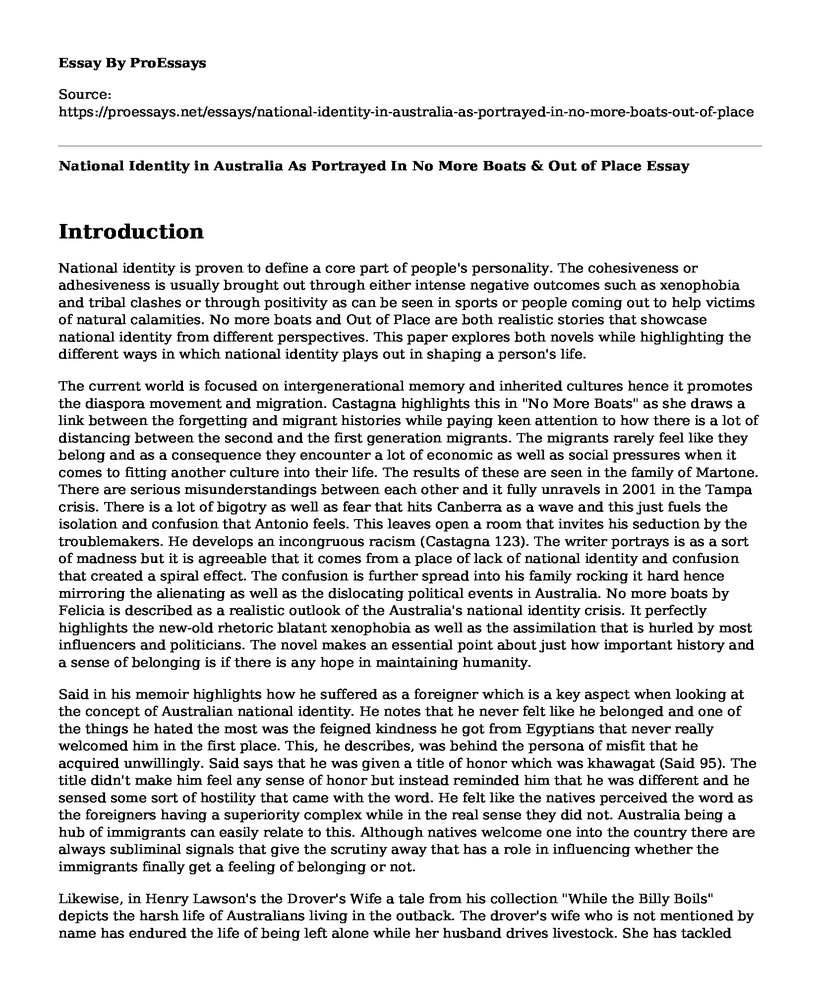Introduction
National identity is proven to define a core part of people's personality. The cohesiveness or adhesiveness is usually brought out through either intense negative outcomes such as xenophobia and tribal clashes or through positivity as can be seen in sports or people coming out to help victims of natural calamities. No more boats and Out of Place are both realistic stories that showcase national identity from different perspectives. This paper explores both novels while highlighting the different ways in which national identity plays out in shaping a person's life.
The current world is focused on intergenerational memory and inherited cultures hence it promotes the diaspora movement and migration. Castagna highlights this in "No More Boats" as she draws a link between the forgetting and migrant histories while paying keen attention to how there is a lot of distancing between the second and the first generation migrants. The migrants rarely feel like they belong and as a consequence they encounter a lot of economic as well as social pressures when it comes to fitting another culture into their life. The results of these are seen in the family of Martone. There are serious misunderstandings between each other and it fully unravels in 2001 in the Tampa crisis. There is a lot of bigotry as well as fear that hits Canberra as a wave and this just fuels the isolation and confusion that Antonio feels. This leaves open a room that invites his seduction by the troublemakers. He develops an incongruous racism (Castagna 123). The writer portrays is as a sort of madness but it is agreeable that it comes from a place of lack of national identity and confusion that created a spiral effect. The confusion is further spread into his family rocking it hard hence mirroring the alienating as well as the dislocating political events in Australia. No more boats by Felicia is described as a realistic outlook of the Australia's national identity crisis. It perfectly highlights the new-old rhetoric blatant xenophobia as well as the assimilation that is hurled by most influencers and politicians. The novel makes an essential point about just how important history and a sense of belonging is if there is any hope in maintaining humanity.
Said in his memoir highlights how he suffered as a foreigner which is a key aspect when looking at the concept of Australian national identity. He notes that he never felt like he belonged and one of the things he hated the most was the feigned kindness he got from Egyptians that never really welcomed him in the first place. This, he describes, was behind the persona of misfit that he acquired unwillingly. Said says that he was given a title of honor which was khawagat (Said 95). The title didn't make him feel any sense of honor but instead reminded him that he was different and he sensed some sort of hostility that came with the word. He felt like the natives perceived the word as the foreigners having a superiority complex while in the real sense they did not. Australia being a hub of immigrants can easily relate to this. Although natives welcome one into the country there are always subliminal signals that give the scrutiny away that has a role in influencing whether the immigrants finally get a feeling of belonging or not.
Likewise, in Henry Lawson's the Drover's Wife a tale from his collection "While the Billy Boils" depicts the harsh life of Australians living in the outback. The drover's wife who is not mentioned by name has endured the life of being left alone while her husband drives livestock. She has tackled floods, fires, and even a snake that had sneaked into her house with courage while at the same time being a loving mother to her four children.
Conclusion
In summation, Lawson depicts the life of Australians in the outback as tough but one that illuminates the courage of Australians (Lawson).
Works Cited
Castagna, Felicity. No More Boats. Giramondo Publishing, 2017.
Lawson, Henry. While The Billy Boils: The Drovers Wife. Angus & Robertson, 1896.
Said, Edward W. Out of Place: A Memoir. Granta, 2010.
Cite this page
National Identity in Australia As Portrayed In No More Boats & Out of Place. (2022, Jun 19). Retrieved from https://proessays.net/essays/national-identity-in-australia-as-portrayed-in-no-more-boats-out-of-place
If you are the original author of this essay and no longer wish to have it published on the ProEssays website, please click below to request its removal:
- My Father's Gift
- Definition Essay on Extended Family Life in the Caribbean
- Quetzali Essay Example
- The Business Case for Diversity Paper Example
- Essay Example on Louisiana: A Rich Tapestry of Cultures & Traditions
- Essay Example on Two Parents, One Family: A Guide to Raising Kids in a Stable Home
- Paper Example on Native Americans Face Homelessness: The Story of Jackson Jackson







